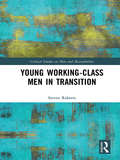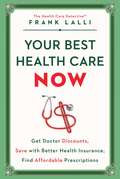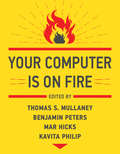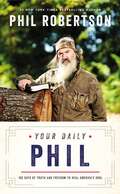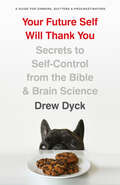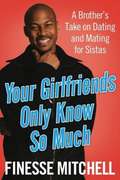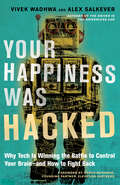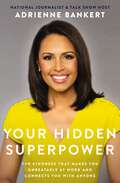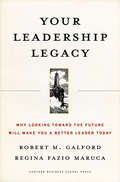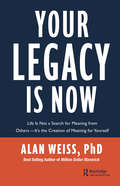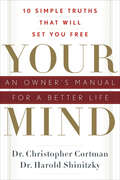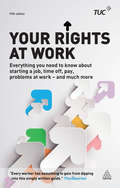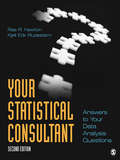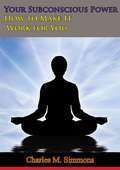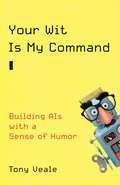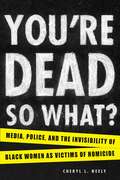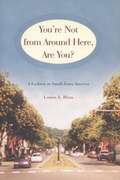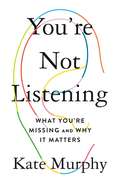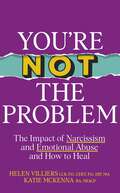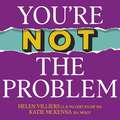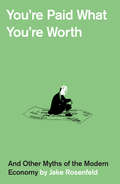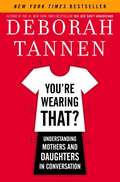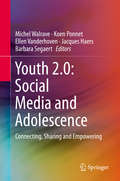- Table View
- List View
Young Working-Class Men in Transition (Critical Studies of Men and Masculinities)
by Steven RobertsYoung Working Class Men in Transition uses a unique blend of concepts from the sociologies of youth and masculinity combined with Bourdieusian social theory to investigate British young working-class men’s transition to adulthood. Indeed, utilising data from biographical interviews as well as an ethnographic observation of social media activity, this volume provides novel insights by following young men across a seven-year time period. Against the grain of prominent popular discourses that position young working-class men as in ‘crisis’ or as adhering to negative forms of traditional masculinity, this book consequently documents subtle yet positive shifts in the performance of masculinity among this generation. Underpinned by a commitment to a much more expansive array of emotionality than has previously been revealed in such studies, young men are shown to be engaged in school, open to so called ‘women’s work’ in the service sector, and committed to relatively egalitarian divisions of labour in the family home. Despite this, class inequalities inflect their transition to adulthood with the ‘toxicity’ neoliberalism - rather than toxic masculinity - being core to this reality. Problematising how working-class masculinity is often represented, Young Working Class Men in Transition both demonstrates and challenges the portrayal of working class masculinity as a repository of homophobia, sexism and anti-feminine acting. It will appeal to students and researchers interested in fields such as youth studies, masculinity studies, gender studies, sociology of education and sociology of work.
Your Best Health Care Now: Get Doctor Discounts, Save With Better Health Insurance, Find Affordable Prescriptions
by Frank LalliInspired by his viral New York Times article, prize-winning investigative journalist Frank Lalli details how he mastered the ins and outs of health care--and how you, too, can get the best care for your money.Frank Lalli, the former editor of Money and George magazines, has devoted his career to getting to the bottom of a good story. When he was diagnosed with Multiple Myeloma, a rare but potentially deadly blood cancer, he put his reporter's instincts to work and got the wonder drug he needed at an affordable price--thousands of dollars less than he was told he would have to spend. Amazed by the complex and arbitrary nature of the health care system, he decided to share what he has learned as his own Health Care Detective so that others can find their best care and save money, too. Based on three years of research and more than 300 first-hand interviews with experts, Your Best Health Care Now is your easy-to-follow, real-world guide to making today's health system work for you. You'll learn all the smart moves and timely tips to get better care and save hundreds, if not thousands, of dollars--no matter what your concerns may be. Whether you're trying to book a free check-up or negotiate with a surgeon, looking for an effective generic drug or the best price for a brand-name, or worrying about high insurance deductibles and rising premiums or a stack of surprise bills, Your Best Health Care Now has the answers you need to take charge of your wellbeing.
Your Computer Is on Fire
by Thomas Mullaney Benjamin Peters Mar Hicks Kavita PhilipTechno-utopianism is dead: Now is the time to pay attention to the inequality, marginalization, and biases woven into our technological systems.This book sounds an alarm: after decades of being lulled into complacency by narratives of technological utopianism and neutrality, people are waking up to the large-scale consequences of Silicon Valley-led technophilia. This book trains a spotlight on the inequality, marginalization, and biases in our technological systems, showing how they are not just minor bugs to be patched, but part and parcel of ideas that assume technology can fix--and control--society.ContributorsJanet Abbate, Ben Allen, Paul N. Edwards, Nathan Ensmenger, Mar Hicks, Halcyon M. Lawrence, Thomas S. Mullaney, Safiya Umoja Noble, Benjamin Peters, Kavita Philip, Sarah T. Roberts, Sreela Sarkar, Corinna Schlombs, Andrea Stanton, Mitali Thakor, Noah Wardrip-Fruin
Your Daily Phil: 100 Days of Truth and Freedom to Heal America's Soul
by Phil RobertsonA daily dose of truth, morality, and biblical wisdom from A&E Duck Dynasty patriarch Phil Robertson in this 100-day devotional.There is a war being waged on the soul of America, but Phil Robertson believes there is hope. In this compilation of 100 days of readings taken from his bestselling books The Theft of America&’s Soul and Jesus Politics, now with newly added prayers and Bible verses, he shows how Americans can turn away from the lies of the devil and embrace the life-giving, healing, and wholly transforming love of God, helping to bring the kingdom of heaven to our homes, neighborhoods, churches, communities, and country. These 100 devotionals cover God-honoring principles, includingcommitting to the life of Christ and his words;understanding the importance of kindness, respect, hard work, and financial stewardship;enjoying God&’s creation—Earth, animals, and each other.Written with captivating storytelling and unflinching honesty, this book is a call for Christians to wake up and use their time, talents, resources, influence, and votes to protect and advance the policies of King Jesus—the only policies that will truly heal the soul of America.
Your Future Self Will Thank You: Secrets to Self-Control from the Bible and Brain Science (A Guide for Sinners, Quitters, and Procrastinators)
by Drew DyckWhy can&’t I control my anger? Or stop overeating? Or wasting time online?Why can't I seem to finish my projects? Or make progress in my spiritual life?Why do I fall for the same stupid temptations over and over again?When we fail, its easy to make excuses or blame our circumstances. But let&’s face it: the biggest enemy is usually the one staring back at us from the mirror every morning. We lack self-control. Self-control isn&’t very popular these days. We tend to think of it as boring, confining, the cop that shows up and shuts down the party. But the truth is that people who cultivate this vital virtue lead freer, happier, and more meaningful lives. After all, our bad habits—from the slight to the serious—bring a host of painful consequences. Ultimately, they keep us from becoming the people God created us to be.Your Future Self Will Thank You is a compassionate and humorous guide to breaking bad habits and growing your willpower. It explores Scripture&’s teachings on how to live a disciplined life while offering practical strategies for growth based on the science of self-control. Whether you want to deepen your spiritual life, conquer an addiction, or kick your nail-biting habit, this book will help you get motivated, stay on track, and achieve your goals.Sure, self-control is hard, but it doesn&’t have to be that hard. Get the help you need to be freer, happier, and more productive. Your future self will thank you!
Your Future Self Will Thank You: Secrets to Self-Control from the Bible and Brain Science (A Guide for Sinners, Quitters, and Procrastinators)
by Drew DyckWhy can&’t I control my anger? Or stop overeating? Or wasting time online?Why can't I seem to finish my projects? Or make progress in my spiritual life?Why do I fall for the same stupid temptations over and over again?When we fail, its easy to make excuses or blame our circumstances. But let&’s face it: the biggest enemy is usually the one staring back at us from the mirror every morning. We lack self-control. Self-control isn&’t very popular these days. We tend to think of it as boring, confining, the cop that shows up and shuts down the party. But the truth is that people who cultivate this vital virtue lead freer, happier, and more meaningful lives. After all, our bad habits—from the slight to the serious—bring a host of painful consequences. Ultimately, they keep us from becoming the people God created us to be.Your Future Self Will Thank You is a compassionate and humorous guide to breaking bad habits and growing your willpower. It explores Scripture&’s teachings on how to live a disciplined life while offering practical strategies for growth based on the science of self-control. Whether you want to deepen your spiritual life, conquer an addiction, or kick your nail-biting habit, this book will help you get motivated, stay on track, and achieve your goals.Sure, self-control is hard, but it doesn&’t have to be that hard. Get the help you need to be freer, happier, and more productive. Your future self will thank you!
Your Girlfriends Only Know So Much: A Brother's Take on Dating and Mating for Sistas
by Finesse MitchellFace it. Your girlfriends can tell you what you need to know about just about everything...except men. For that, you need comedian and Essence columnist Finesse Mitchell. Eager to help his sistas out and show them how to avoid the types of men who have left them baffled, blue, or just plain bitter, Mitchell tells the truth, whether it's good, bad, or downright despicable. Your Girlfriends Only Know So Much clues women in to what men are really thinking at every stage of a relationship, from first contact through deciding to propose. Lighthearted and brutally (if hilariously) honest,Your Girlfriends Only Know So Much lets women in on the things only men know about men and, in the process, saves them from wasting time.
Your Happiness Was Hacked: Why Tech Is Winning The Battle To Control Your Brain--and How To Fight Back
by Vivek Wadhwa Alex Salkever<p>Do you feel in control of your life or enslaved by your devices? Have you risked your life texting and driving? Do you sympathize with a test group of students who endured painful shocks rather than be separated from their phones? <p>Digital technology is wonderful, but it's making us miserable, say former tech executives Vivek Wadhwa and Alex Salkever. There's a reason Apple CEO Tim Cook told the Guardian he won't let his nephew on social networks. We've become a nation of tech addicts—although it's not entirely our fault, and it is possible to enjoy the benefits of technology while taking our happiness back from the bots. <p>Wadhwa and Salkever describe the applied neuroscience techniques developers are using to make their products so insidiously habit-forming and, drawing on the latest research, detail the negative impact of technology in four key areas: love, work, play, and life. There are dozens of vivid examples. Online dating apps like Tinder encourage users to evaluate people like products, leading to superficial, unsatisfying relationships. Workers check their email an average of seventy-seven times a day, wreaking havoc on productivity. Children now spend nearly twice as much time playing inside with their screens as they do outside in the natural world—it is any wonder childhood obesity is a problem? The light from the devices so many of us look at right before we go to sleep suppresses the production of melatonin, a hormone vital for sleep and healthy organ functioning. <p>But there's a way out. Wadhwa and Salkever lay out simple, common-sense ways to disrupt developers' efforts to get you hooked, including six simple questions to help you decide what role any given technology should play in your life. Ironically, they even describe some emerging technologies designed to give users more control. Get back to making technology serve you, not the other way around!
Your Hidden Superpower: The Kindness That Makes You Unbeatable at Work and Connects You with Anyone
by Adrienne BankertKindness isn&’t merely about getting along with people and being nice. It&’s a game changer in business, the door-opener to opportunity, and the key to authenticity and confidence. Discover the true potential of kindness and harness its power.Through years of developing her own kindness practices and studying those of others, Good Morning America correspondent and ABC News journalist Adrienne Bankert has experienced firsthand the unbeatable power of kindness and witnessed its transformative impact on others.Adjusting our perspective from being closed off and self-centered to a mindset of kindness ripples into a staggering amount of personal fulfillment and growth.No matter our age or ethnicity, where we come from, or how much money we make, every one of us can be kind. Every one of us can be a change agent.In Your Hidden Superpower, Adrienne will help you:See simple acts of kindness from a new and empowering perspective;Learn how to make kindness a habit and experience more peace, inspiration, and impact;Engage kindness at work and enjoy remarkable opportunities—plus, know how to get from &“here&” to &“there&” quickly; and Activate kindness as a force to reconnect you to your authentic self, replenish your passion and creativity, and find your voice.Your Hidden Superpower describes how kindness is a superpower that can be honed through an intentional lifestyle of kindness and is especially important in these divisive times.
Your Leadership Legacy
by Robert M. Galford Regina Fazio MarucaYou should worry about your legacy later in your career, at the edge of retirement-right? Not according to Robert Galford and Regina Maruca. In Your Leadership Legacy, these authors argue that thinking about your legacy now makes you a better leader today. Based on stories of top leaders who have shaped successful careers, the book explores the art of "legacy thinking," helping you to formulate a legacy that will exert a positive effect on your work immediately. The authors provide a disciplined approach to framing your legacy, as well as shaping it over time. They start with the idea that your legacy is defined by how others approach work and life as a result of having worked with you. They then demonstrate how to assess your current impact on those around you, strengthen that impact, and pass along the best of yourself in the process. While many leaders "find themselves" and hone their work accordingly only after a major life crisis, Your Leadership Legacy enables all leaders to craft their work and build their legacy unburdened by such crises, and to experience personal satisfaction and achievement throughout their working lives.
Your Legacy is Now: Life is Not a Search for Meaning from Others -- It's the Creation of Meaning for Yourself
by Alan WeissFor over 30 years Alan Weiss has consulted, coached, and advised everyone from Fortune 500 executives, state governors, non-profit directors, and entrepreneurs to athletes, entertainers, and beauty pageant contestants. That’s quite an assortment of people, and they run into the thousands. Most of them have had what we euphemistically call "means," and some of them have had a lot more than that. Others have been aspiring and with more ends in sight than means on hand. Alan Weiss states: I’ve dealt with esteem (low), narcissism (high), family problems, leadership dysfunctions, insecurities, addictions, and ethical quandaries. And I’ve talked with them through the coronavirus crisis. But don’t get the wrong idea. About 95% of these people have been well-meaning, honest (to the best of their knowledge), and interested in becoming a better person and better professional. Otherwise, they wouldn’t be talking to me. I found the equivalent of the "runner’s wall" in their journeys, where they must break through the pain and the obstacles and then can keep going with renewed energy and spirit. But runners know how far they must go after the breakthrough, be it another half lap or another five miles. There is a finish line. I’ve found that people in all positions, even after the "breakthrough," don’t know where they are in the race, let alone where the finish line is. They do not know what meaning is for them. They may have money in the bank, good relationships, the admiration of others, and the love of their dogs. But they have no metrics for "What now?" They believe that at the end of life there is a tallying, some metaphysical accountant who totals up their contributions, deducts their bad acts, and creates the (hopefully positive) difference. That difference, they believe, is their "legacy." But the thought that legacy arrives at the end of life is as ridiculous as someone who decides to sell a business and tries to increase its valuation the day prior. Legacy is now. Legacy is daily. Every day we create the next page in our lives, but the question becomes who is writing it and what’s being written. Is someone else creating our legacy? Or are we, ourselves, simply writing the same page repeatedly? Or do we leave it blank? Our organic, living legacy is marred and squeezed by huge normative pressures. There is a "threshold" point, at which one’s beliefs and values are overridden by immense peer pressure. Our metrics are forced to change. In an age of social media, biased press, and bullying, we’ve come to a point where our legacy, ironically, is almost out of our hands. Yet our "meaning" — our creation of meaning and not a search for some illusive alchemy — creates worth and impact for us and all those with whom we interact.
Your Mind: An Owner's Manual for a Better Life
by Dr. Christopher Cortman Harold ShinitzkyTen crucial psychological truths that provide “a clinical framework with concrete ways to tackle standing emotional issues” (Foreword Reviews).During tens of thousands of hours facilitating psychotherapy, Drs. Christopher Cortman and Harold Shinitzky came to realize that most people are unaware of ten crucial psychological truths—truths imperative to maintaining mental health and well-being. As a result of this lack of awareness, people become anxious, depressed, and generally unhappy; if they learn the ten truths, they are more likely to lead productive, fulfilled lives. Do you know that:Emotions are understandable and contain valuable information?Our behavior has a hidden purpose?We all have an internal saboteur whom we must identify and control?We can change how we act if we change how we think?Time heals nothing?Your Mind: An Owner’s Manual for a Better Life combines extensive psychological research with decades of clinical practice in a practical, easy-to-digest narrative. Through examples and exercises, Drs. Cortman and Shinitzky present a step-by-step strategy to help you make use of the truths and become a happier, healthier you.
Your Rights at Work: Everything You Need to Know About Starting a Job, Time off, Pay, Problems at Work - and Much More!
by Trades Union CongressYour Rights at Work is a comprehensive, jargon-free guide to the legal rights of the employee and the responsibilities of the employer. Accessible and reliable, it offers real solutions to the problems and issues that can face anyone at work. Using the law is always a last resort, but if you have to take that step, there is practical advice on that too. Topics covered include: starting a job; parental leave and maternity rights; flexible working; equality law; dismissal and redundancy; pay and holiday rights; grievance procedures and how to enforce your rights. Your Rights at Work is written by employment experts at the Trade Union Congress (TUC). As the people who campaigned for many of the rights set out in this book, there is no one better to explain how they should apply in your workplace and what to do if they don't.
Your Special Education Rights: What Your School District Isn't Telling You
by Jennifer Laviano Julie SwansonDrawing on decades of experience, Jennifer Laviano, a high-profile special education attorney, and Julie Swanson, a sought-after special education advocate, help parents of students with disabilities navigate their school systems to get the services they need for their children.Parents will find no other book on special education like Your Special Education Rights. Julie and Jennifer demystify the federal laws that govern the rights of public school children with disabilities and explain how school districts often ignore or circumvent these laws. They pull the curtain back on the politics of special education, exposing truths that school districts don’t want you to know, such as the fact that teachers are often under extraordinary pressure not to spend resources on services.Most importantly, they outline the central rights you and your child have regarding your child’s education. Did you know that you can refer your child for a special education evaluation? That you can ask for a second opinion if you disagree with the results of some or all of the testing? That you are entitled to parent counseling, training, and more?They also show you how to take that knowledge and apply it to advocating for your child. Here’s what you need to know about the paperwork you will have to complete, detailed information on how to advocate for your child and how to craft language in documents that benefit your child, and more.Filled with vital information and invaluable resources, Your Special Education Rights gives you the information you need to help your child succeed in school and beyond.
Your Statistical Consultant: Answers to Your Data Analysis Questions
by Dr Rae R. Newton Dr Kjell Erik RudestamAlthough many graduate students and researchers have had course work in statistics, they sometimes find themselves stumped in proceeding with a particular data analysis question. In fact, statistics is often taught as a lesson in mathematics as opposed to a strategy for answering questions about world[?], leaving beginning researchers at a loss for how to proceed. In these situations, it is common to turn to a statistical expert, the "go to" person when questions regarding appropriate data analysis emerge. Your Statistical Consultant is an authentic alternative resource for describing, explaining, and making recommendations regarding thorny or confusing statistical issues. Written to be responsive to a wide range of inquiries and levels of expertise, this book is flexibly organized so readers can either read it sequentially or turn directly to the sections that correspond to their concerns and questions.
Your Subconscious Power: How to Make It Work for You
by Charles M. SimmonsA step-by-step, day-by-day plan for gearing your everyday living to the powerful, life-shaping force within you…for lasting satisfaction and achievement!This book, which was first published in 1957, contains 10 Practice Projects that actually make you live with YOUR SUBCONSCIOUS POWER…that puts all its potential energies to work for you!“Charles M. Simmons has a unique place in the field of adult education. He has the ability to get people excited about their own possibilities without false stimulation—intoxication without alcohol! He is able to help them apply this enthusiasm and positive attitude for practical ends. He appeals to large groups of adults with high levels of intelligence and success. I can anticipate that his book—Your Subconscious Power—will be filled with his enthusiasm and wisdom. There’s never a dull moment with the Simmons approach!”—William B. McCoard, Ph.D., Professor of Speech, University of Southern California“Charles M. Simmons is making history. He will challenge you into action. His book helps focus action on fundamentals that get results. Its method is simple but powerful. Read the book carefully and things will happen! Read it and apply it—things will happen!”—Warren O. Wagner, Consulting Engineer, Pasadena, California
Your Wit Is My Command: Building AIs with a Sense of Humor
by Tony VealeFor fans of computers and comedy alike, an accessible and entertaining look into how we can use artificial intelligence to make smart machines funny.Most robots and smart devices are not known for their joke-telling abilities. And yet, as computer scientist Tony Veale explains in Your Wit Is My Command, machines are not inherently unfunny; they are just programmed that way. By examining the mechanisms of humor and jokes--how jokes actually works--Veale shows that computers can be built with a sense of humor, capable not only of producing a joke but also of appreciating one. Along the way, he explores the humor-generating capacities of fictional robots ranging from B-9 in Lost in Space to TARS in Interstellar, maps out possible scenarios for developing witty robots, and investigates such aspects of humor as puns, sarcasm, and offensiveness. In order for robots to be funny, Veale explains, we need to analyze humor computationally. Using artificial intelligence (AI), Veale shows that joke generation is a knowledge-based process--a sense of humor is blend of wit and wisdom. He notes that existing technologies can detect sarcasm in conversation, and explains how some jokes can be pre-scripted while others are generated algorithmically--all while making the technical aspects of AI accessible for the general reader. Of course, there's no single algorithm or technology that we can plug in to make our virtual assistants or GPS voice navigation funny, but Veale provides a computational roadmap for how we might get there.
You're Dead--So What? Media, Police, and the Invisibility of Black Women as Victims of Homicide
by Cheryl L. NeelyThis book provides an empirical study of media and law enforcement bias in reporting and investigating homicides of African-American women compared with their white counterparts. The author discusses the symbiotic relationship between media coverage and the response from law enforcement to victims of color. A deeply troubling disparity in reporting the disappearance and homicides of female victims reflects racial inequality and institutionalized racism in the social structure that need to be addressed.
You're Not from Around Here, Are You: A Lesbian in Small-Town America
by Louise A. BlumThis is a funny, moving story about life in a small town, from the point of view of a pregnant lesbian. Louise A. Blum, author of the critically acclaimed novel Amnesty, now tells the story of her own life and her decision to be out, loud, and pregnant. Mixing humor with memorable prose, Blum recounts how a quiet, conservative town in an impoverished stretch of Appalachia reacts as she and a local woman, Connie, fall in love, move in together, and determine to live their life together openly and truthfully. The town responds in radically different ways to the couple’s presence, from prayer vigils on the village green to a feature article in the family section of the local newspaper. This is a cautionary, wise, and celebratory tale about what it’s like to be different in America—both the good and the bad. A depiction of small town life with all its comforts and its terrors, this memoir speaks to anyone who has ever felt like an outsider in America. Blum tells her story with a razor wit and deft precision, a story about two "girls with grit," and the child they decide to raise, right where they are, in small town America.
You're Not Listening: What You're Missing and Why It Matters
by Kate MurphyWhen was the last time you listened to someone, or someone really listened to you?"If you’re like most people, you don’t listen as often or as well as you’d like. There’s no one better qualified than a talented journalist to introduce you to the right mindset and skillset—and this book does it with science and humor." -Adam Grant, #1 New York Times bestselling author of Originals and Give and Take"An essential book for our times."-Lori Gottlieb, New York Times bestselling author of Maybe You Should Talk to SomeoneAt work, we’re taught to lead the conversation.On social media, we shape our personal narratives.At parties, we talk over one another. So do our politicians.We’re not listening.And no one is listening to us.Despite living in a world where technology allows constant digital communication and opportunities to connect, it seems no one is really listening or even knows how. And it’s making us lonelier, more isolated, and less tolerant than ever before. A listener by trade, New York Times contributor Kate Murphy wanted to know how we got here.In this always illuminating and often humorous deep dive, Murphy explains why we’re not listening, what it’s doing to us, and how we can reverse the trend. She makes accessible the psychology, neuroscience, and sociology of listening while also introducing us to some of the best listeners out there (including a CIA agent, focus group moderator, bartender, radio producer, and top furniture salesman). Equal parts cultural observation, scientific exploration, and rousing call to action that's full of practical advice, You're Not Listening is to listening what Susan Cain's Quiet was to introversion. It’s time to stop talking and start listening.
You’re Not the Problem: The Impact of Narcissism and Emotional Abuse and How to Heal
by Katie McKenna Helen VilliersHelen & Katie's advice will change your life. It did mine. - Kay Allinson, co-founder of Pinch of NomThis book will show you what a narcissist looks like and how their emotional abuse impacts the lives and relationships of their families.Many emotionally abusive behaviours from parent to child have become socially acceptable; because they're so prolific, they're normalised. Furthermore, humans often repeat relational patterns, passing the baton of trauma from generation to generation, until someone decides to change things. You're Not the Problem shows you how to recognise these behaviours and realise the profound impact they have had, and still have, and to see the patterns they form in our relationships with parents, partners, friends and colleagues. Using stories and examples from their clinical experience and extensive research, psychotherapists Helen Villiers and Katie McKenna share: · What Narcissistic Personality Disorder is· How to recognise emotional abuse in family relationships· The immediate and long-term impact · Practical strategies for healing· How to avoid repeating these behaviours With a compassionate, sympathetic approach to looking at your familial patterns, Villiers and McKenna show you how to truly break free from these toxic relationships and reclaim your life.
You’re Not the Problem - Sunday Times bestseller: The Impact of Narcissism and Emotional Abuse and How to Heal
by Katie McKenna Helen VilliersTop 10 Irish Bestseller'Helen & Katie's advice will change your life. It did mine.' - Kay Allinson, co-founder of Pinch of NomThis book will show you what a narcissist looks like and how their emotional abuse impacts the lives and relationships of their families.Many emotionally abusive behaviours from parent to child have become socially acceptable; because they're so prolific, they're normalised. Furthermore, humans often repeat relational patterns, passing the baton of trauma from generation to generation, until someone decides to change things. You're Not the Problem shows you how to recognise these behaviours and realise the profound impact they have had, and still have, and to see the patterns they form in our relationships with parents, partners, friends and colleagues. Using stories and examples from their clinical experience and extensive research, psychotherapists Helen Villiers and Katie McKenna share: · What Narcissistic Personality Disorder is· How to recognise emotional abuse in family relationships· The immediate and long-term impact · Practical strategies for healing· How to avoid repeating these behaviours With a compassionate, sympathetic approach to looking at your familial patterns, Villiers and McKenna show you how to truly break free from these toxic relationships and reclaim your life.
You’re Paid What You’re Worth: And Other Myths Of The Modern Economy
by Jake RosenfeldA myth-busting book challenges the idea that we’re paid according to objective criteria and places power and social conflict at the heart of economic analysis.Your pay depends on your productivity and occupation. If you earn roughly the same as others in your job, with the precise level determined by your performance, then you’re paid market value. And who can question something as objective and impersonal as the market? That, at least, is how many of us tend to think. But according to Jake Rosenfeld, we need to think again.Job performance and occupational characteristics do play a role in determining pay, but judgments of productivity and value are also highly subjective. What makes a lawyer more valuable than a teacher? How do you measure the output of a police officer, a professor, or a reporter? Why, in the past few decades, did CEOs suddenly become hundreds of times more valuable than their employees? The answers lie not in objective criteria but in battles over interests and ideals. In this contest four dynamics are paramount: power, inertia, mimicry, and demands for equity. Power struggles legitimize pay for particular jobs, and organizational inertia makes that pay seem natural. Mimicry encourages employers to do what peers are doing. And workers are on the lookout for practices that seem unfair. Rosenfeld shows us how these dynamics play out in real-world settings, drawing on cutting-edge economics, original survey data, and a journalistic eye for compelling stories and revealing details.At a time when unions and bargaining power are declining and inequality is rising, You’re Paid What You’re Worth is a crucial resource for understanding that most basic of social questions: Who gets what and why?
You're Wearing That?: Understanding Mothers and Daughters in Conversation
by Deborah TannenMothers and daughters speak the same language, but often misunderstand each other, as they struggle to achieve a balance between closeness and independence.
Youth 2.0: Social Media and Adolescence
by Michel Walrave Koen Ponnet Ellen Vanderhoven Jacques Haers Barbara SegaertThis book grasps the duality between opportunities and risks which arise from children's and adolescents' social media use. It investigates the following main themes, from a multidisciplinary perspective: identity, privacy, risks and empowerment. Social media have become an integral part of young people's lives. While social media offer adolescents opportunities for identity and relational development, adolescents might also be confronted with some threats. The first part of this book deals with how young people use social media to express their developing identity. The second part revolves around the disclosure of personal information on social network sites, and concentrates on the tension between online self-disclosure and privacy. The final part deepens specific online risks young people are confronted with and suggests solutions by describing how children and adolescents can be empowered to cope with online risks. By emphasizing these different, but intertwined topics, this book provides a unique overview of research resulting from different academic disciplines such as Communication Studies, Education, Psychology and Law. The outstanding researchers that contribute to the different chapters apply relevant theories, report on topical research, discuss practical solutions and reveal important emerging issues that could lead future research agendas.
